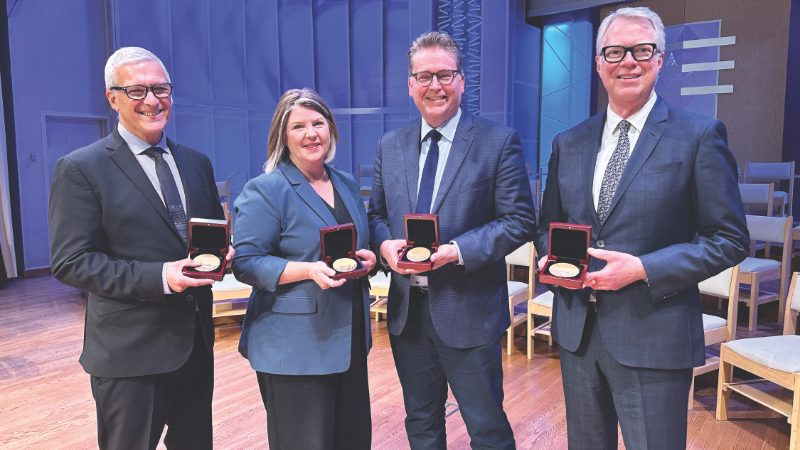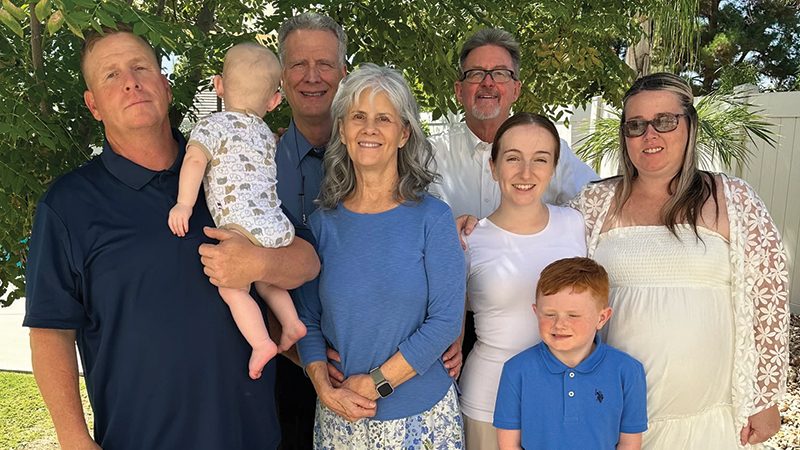From a presentation at the May 2024 James Madison Awards in Westlake Village, California
The 1960s were years of flux and upheaval. In a decade marked by controversies and changing direction, the Church State Council was born. For me, Civil Rights protests are just lessons from history books, but those protest movements were impacting and powerful. When President Johnson signed the Civil Rights Act into law, it contained for the first time religion-based employment protections, something that became a big focus of the Church State Council through the years.
In 1964, when the leaders of the Pacific Union Conference signed the Church State Council into existence, their goal was to focus on education, on lobbying, on building relationships with people in power on behalf of religious freedom. Their first James Madison Award was handed out to President Dwight Eisenhower. When he accepted the award, President Eisenhower said he was going to make sure that this award hung on the wall of the Presidential library in Abilene, Kansas.
In the years that followed this kick-off event, the Church State Council went from strength to strength. Music concerts, lecture series, new chapters, award ceremonies—there were many, many proud moments. The founders realized that religious freedom advocacy had to be big. You can't do advocacy from inside a bunker.
You have to get out. You have to build bridges. You have to reach across divides of religion, of worldview, of politics. You have to make partnerships—sometimes with unlikely people—in the cause of religious freedom. That was a mandate back in 1964, and that is what the Church State Council has been doing ever since.
There are people who seem to think that their moral convictions, their understanding of theology, must line up perfectly with American law. But that is a subversion of what religious liberty is.

I had studied the theory of religious liberty, but the first time I started to understand what it really means, I was on a trip to Indonesia with the then-president of the Adventist Church, Jan Paulsen. When Dr. Paulsen traveled to different countries to visit with church members and leaders, he often liked to visit political leaders as well. Part of my job was to help set up those meetings and to attend them—in Angola, Mozambique, India, Cambodia, China, Hong Kong, Sri Lanka, Brazil, and Russia.
And the goal of these meetings was the same: to let the governments of these countries know that Seventh-day Adventists are good citizens. We may be a minority, but we have something positive to contribute. We contribute in healthcare, education, and many other areas. The other thing we wanted to address in these meetings was the issue of religious freedom and how religious minorities are treated.
I remember one meeting in Jakarta. As I watched the face of the Minister of Religion and Culture with whom we were meeting, I realized that he had practiced his response. He quoted word for word his country’s constitution and how it protects religious traditions of every kind. And he was absolutely right—the words were right there in his constitution.
In many of these countries where religious freedom is threatened, there's a dominant faith tradition. In this country, Indonesia, that tradition is Islam. Muslim practices and ideas and assumptions are baked into everyday life. If you are a Christian, an atheist, or a Buddhist, you're on the outside. You are somewhat suspect.
After this meeting we had a chance to meet with church leaders of other faiths and also our own church members, not just in Jakarta but in some other provinces.
They told us terrible stories of discrimination, of jobs lost, of social hostility and violence, of the very real fear they faced on a daily basis just for living their faith—because that country has strong blasphemy and apostasy laws, and they're enforced. A few years ago, a man in one of the outer provinces posted on Facebook that he had left Islam and become an atheist. His neighbors surrounded his house, pulled him out, and started to beat him. Someone called the police, and the police arrested the man who was being beaten because it is a crime in Indonesia to promote atheism.
Some of the most creative fiction you will ever read is in the constitutions of some countries. No matter how beautifully crafted those words are, they are absolutely meaningless when the government has its thumb on the scale in favor of one religion over another. Those words are meaningless when religious freedom is weighted differently depending on what religious tradition you come from.
The Church State Council has been standing for six decades for a radically different version of religious freedom that says religious freedom belongs to you not because of what you believe or what you don't believe but by simple virtue of your humanity. We’re incredibly proud of the work that the Church State Council does so well, because every day they stay true to that original mandate from 1964. They're thinking big, for sure, but first and foremost, they are working to reflect the character of the Creator God who endowed each one of us with infinite worth, infinite value, infinite dignity, and the right to live according to our deepest convictions.
_____________________________
Bettina Krause is associate director of Public Affairs and Religious Liberty at the North American Division and editor of Liberty Magazine.
60 años del Church State Council
De una presentación en los James Madison Awards en mayo de 2024 en Westlake Village, California
Por Bettina Krause
La década de 1960 estuvo marcada por años de cambios y agitación. En una década marcada por controversias y cambios de dirección, nació el Church State Council. Para mí, las protestas por los derechos civiles son solo lecciones de los libros de historia, pero esos movimientos de protesta fueron impactantes y enérgicos. Cuando el presidente Johnson promulgó la Ley de Derechos Civiles, contenía por primera vez protecciones laborales basadas en la religión, algo que se convirtió en un gran enfoque del Church State Council a lo largo de los años.
En 1964, cuando los líderes de la Pacific Union Conference firmaron la creación del Church State Council, su objetivo era centrarse en la educación, el cabildeo, el establecimiento de relaciones con las personas en el poder en nombre de la libertad religiosa. Su primer James Madison Award fue entregado al presidente Dwight Eisenhower. Cuando aceptó el premio, el presidente Eisenhower dijo que se aseguraría de que ese premio colgase en la pared de la biblioteca presidencial en Abilene, Kansas.
En los años que siguieron a ese evento inicial, el Church State Council se fortaleció. Hubo muchos momentos de orgullo: conciertos de música, ciclos de conferencias, nuevas sucursales, ceremonias de premiación. Los fundadores se dieron cuenta de que la defensa de la libertad religiosa tenía que ser considerable. No se puede hacer incidencia desde el interior de un búnker.
Tienes que salir. Hay que tender puentes. Hay que superar las divisiones de la religión, de la cosmovisión, de la política. Hay que hacer alianzas, a veces con personas improbables, en la causa de la libertad religiosa. Ese fue un mandato en 1964, y eso es lo que el Church State Council ha estado haciendo desde entonces.
Hay personas que parecen pensar que sus convicciones morales, su comprensión teológica, deben alinearse perfectamente con la ley estadounidense. Pero eso es una subversión de lo que es la libertad religiosa.

Había estudiado la teoría de la libertad religiosa, pero la primera vez que empecé a entender lo que realmente significaba, estaba en un viaje a Indonesia con el entonces presidente de la Iglesia Adventista, Jan Paulsen. Cuando el Dr. Paulsen viajaba a diferentes países para visitar a los miembros y líderes de la iglesia, a menudo también le gustaba visitar a los líderes políticos. Parte de mi trabajo consistía en ayudar a organizar esas reuniones y asistir a ellas, en Angola, Mozambique, India, Camboya, China, Hong Kong, Sri Lanka, Brasil y Rusia.
El objetivo de esas reuniones era el mismo: hacer saber a los gobiernos de esos países que los adventistas del séptimo día son buenos ciudadanos. Puede que seamos una minoría, pero tenemos algo positivo que aportar. Contribuimos en salud, educación y muchas otras áreas. La otra cosa que queríamos abordar en esas reuniones era el tema de la libertad religiosa y cómo se trata a las minorías religiosas.
Recuerdo una reunión en Yakarta. Al observar el rostro del Ministro de Religión y Cultura con el que nos reunimos, me di cuenta de que había practicado su respuesta. Citó palabra por palabra la constitución de su país y cómo protege las tradiciones religiosas de todo tipo. Y tenía razón, las palabras estaban ahí en su constitución.
En muchos de esos países donde la libertad religiosa está amenazada, hay una tradición religiosa dominante. En ese país, Indonesia, esa tradición es el Islam. Las prácticas, ideas y suposiciones musulmanas están incorporadas a la vida cotidiana. Si eres cristiano, ateo o budista, estás fuera. Te ven con sospecha.
Después de esa reunión, tuvimos la oportunidad de reunirnos con líderes de iglesias de otras religiones y también con miembros de nuestra iglesia, no solo en Yakarta sino en algunas otras provincias.
Nos contaron historias terribles de discriminación, de empleos perdidos, de hostilidad social y violencia, del temor muy real que enfrentaban a diario solo por vivir su fe, porque ese país tiene firmes leyes contra la blasfemia y la apostasía, y se aplican. Hace unos años, un hombre de una de las provincias periféricas publicó en Facebook que había abandonado el Islam y se había convertido en ateo. Sus vecinos rodearon su casa, lo sacaron y comenzaron a golpearlo. Alguien llamó a la policía y la policía arrestó al hombre que estaba siendo golpeado porque es un delito en Indonesia promover el ateísmo.
Algunas de las obras de ficción más creativas que jamás hayas leído se encuentran en las constituciones de algunos países. No importa cuán bellamente elaboradas sean esas palabras, no tienen ningún sentido cuando el gobierno tiene su pulgar en la balanza a favor de una religión sobre otra. Esas palabras no tienen sentido cuando la libertad religiosa se pondera de manera diferente dependiendo de la tradición religiosa de la que provengas.
El Church State Council ha defendido durante seis décadas una versión radicalmente diferente de la libertad religiosa que dice que la libertad religiosa te pertenece no por lo que crees o lo que no crees, sino por la simple virtud de tu humanidad. Estamos increíblemente orgullosos del trabajo que el Church State Council hace tan bien, porque todos los días se mantienen fieles a ese mandato original de 1964. Están pensando en grande, sin duda, pero ante todo, están trabajando para reflejar el carácter del Dios Creador que nos dotó con un mérito infinito, un valor infinito, una dignidad infinita y el derecho a vivir de acuerdo con nuestras convicciones más profundas.
_____________________________
Bettina Krause es directora asociada de Public Affairs and Religious Liberty en la División Norteamericana y editora de la revista Liberty .






